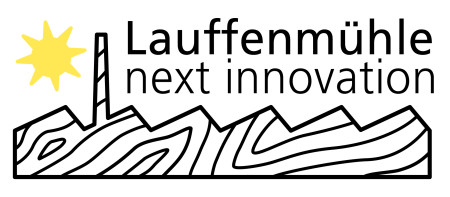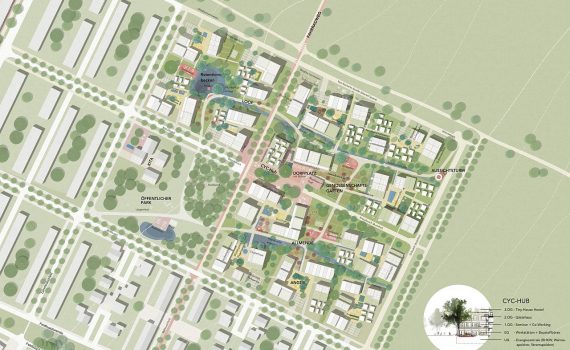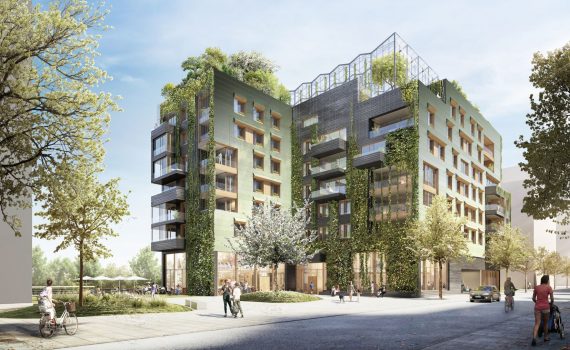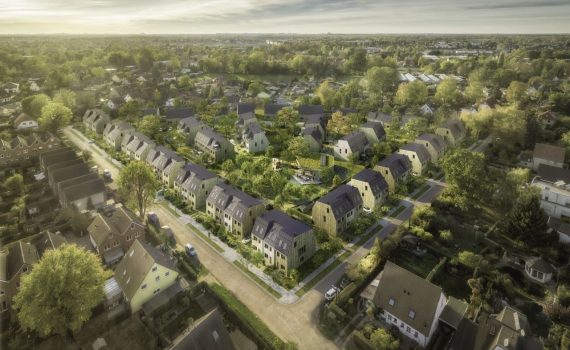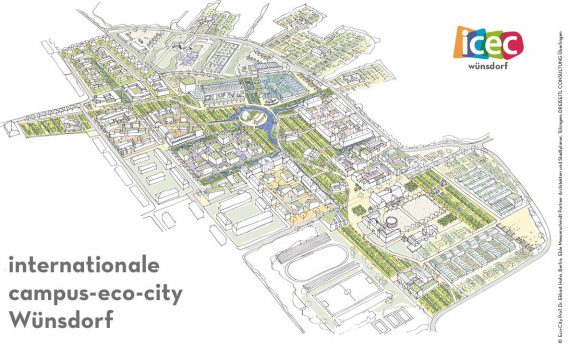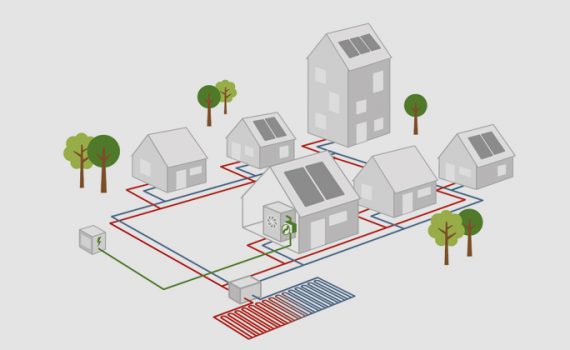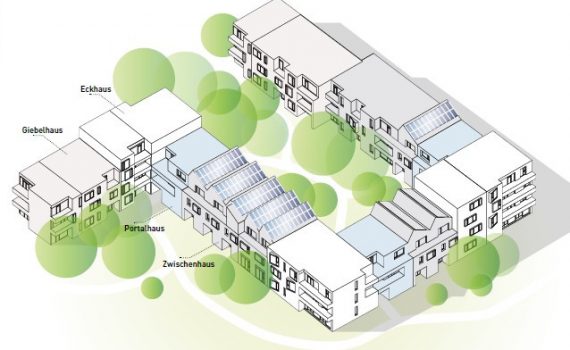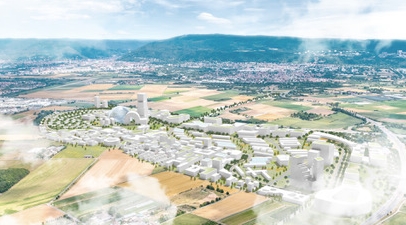D – 13405 Berlin: In direkter Nachbarschaft zum durch die Fachpresse bekannten „Schumacher Quartier“ ensteht auf einer Fläche von 202 ha ein Innovationspark für urbane Technologien: Berlin TXL – The Urban Tech Republic. Die grünen Zukunftstechnologien, die in der Urban Tech Republic entwickelt und produziert werden, sollen u.a. auch direkt bei der Entwicklung des neuen Schumacher Holzbau-Quartiers zur Anwendung kommen. Neben den geplanten 5000 Wohnungen für mehr als 10.000 Menschen sollen auch alle weiteren Einrichtungen wie Schulen, Kitas, Sportanlagen, Einkaufsmöglichkeiten so weit es geht in Holzbauweise entstehen. Insgesamt umfasst das Gesamtgebiet Berlin TXL (Wohnquartiere, Innovationspark und großzügiger Grünflächen) eine Fläche von 500 ha.
Dekade: In the making
D – 51465 Bergisch Gladbach: Das Energiekonzept des Zanders-Areals basiert auf einer nachhaltigen und effizienten Nutzung von Energie. Es umfasst die Verwendung erneuerbarer Energien wie Solarenergie und Biomasse, um den Energiebedarf des Areals zu decken. Das Ziel ist es, eine umweltfreundliche und ressourcenschonende Energieversorgung zu gewährleisten.
 80997 Munich-Untermenzing: A total of 1,300 flats in timber hybrid construction are to be built on the 12-hectare site. There will also be a three-form entry primary school, daycare centres, a neighbourhood square with a café and small local amenities as well as an extensive public green park. With 1,300 residential units in timber construction, it will be the largest timber housing estate in Bavaria and one of the top 5 in Europe. Completion: 2030
80997 Munich-Untermenzing: A total of 1,300 flats in timber hybrid construction are to be built on the 12-hectare site. There will also be a three-form entry primary school, daycare centres, a neighbourhood square with a café and small local amenities as well as an extensive public green park. With 1,300 residential units in timber construction, it will be the largest timber housing estate in Bavaria and one of the top 5 in Europe. Completion: 2030
 D - 53340 Meckenheim: The aim of the Bio-Innovation Park development is to establish a coherent area of expertise of high quality in terms of content and space. To this end, it is essential to differentiate the respective areas according to different location qualities (1a, 1b, 2) in order to formulate and maintain specific quality requirements for potential investors at 1a locations. In this way, it is possible to develop a high-quality "showcase" in the direction of the main axes of the Rhineland Bio-Innovation Park.
D - 53340 Meckenheim: The aim of the Bio-Innovation Park development is to establish a coherent area of expertise of high quality in terms of content and space. To this end, it is essential to differentiate the respective areas according to different location qualities (1a, 1b, 2) in order to formulate and maintain specific quality requirements for potential investors at 1a locations. In this way, it is possible to develop a high-quality "showcase" in the direction of the main axes of the Rhineland Bio-Innovation Park.
 D - 78315 Radolfzell on Lake Constance: Constance University of Applied Sciences designed an urban building model with examples of buildings such as offices, production facilities and warehouses. This was used to calculate the life cycle costs and emissions resulting from the energy supply. The energy supply for heating, cooling, air, light and electricity was optimised and energy requirements minimised. Companies can also utilise the knowledge gained from this for their new buildings. A hydrogen storage system was modelled as an optional scenario in the study.
D - 78315 Radolfzell on Lake Constance: Constance University of Applied Sciences designed an urban building model with examples of buildings such as offices, production facilities and warehouses. This was used to calculate the life cycle costs and emissions resulting from the energy supply. The energy supply for heating, cooling, air, light and electricity was optimised and energy requirements minimised. Companies can also utilise the knowledge gained from this for their new buildings. A hydrogen storage system was modelled as an optional scenario in the study.
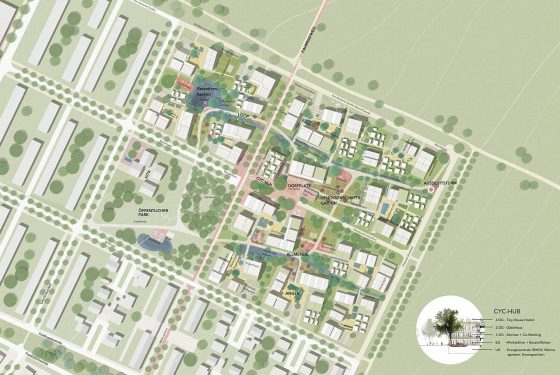 D - 30539 Hanover Kronsberg: adjacent to the Expo-Settlement Hanover-Kronsberg soll das "ecovillage Kronsberg" entstehen. Träger ist die Genossenschaft ecovillage hannover eG, die 2019 gegründet wurde. Die Genossenschaft hat das 49.300 m² große Grundstück 2021 von der Stadt Hannover gekauft. Ab 5/2024 befindet sich die Genossenschaft in einem Insolvenzverfahren in Eigenverwaltung. Fertigstellung: ?
D - 30539 Hanover Kronsberg: adjacent to the Expo-Settlement Hanover-Kronsberg soll das "ecovillage Kronsberg" entstehen. Träger ist die Genossenschaft ecovillage hannover eG, die 2019 gegründet wurde. Die Genossenschaft hat das 49.300 m² große Grundstück 2021 von der Stadt Hannover gekauft. Ab 5/2024 befindet sich die Genossenschaft in einem Insolvenzverfahren in Eigenverwaltung. Fertigstellung: ?
![]() D - 52459 Schophoven: in Schophoven, on the probable shore edge of the Indesee, a prototypical quarter will be created to serve as a model settlement. Here, work is being done on a structural realisation of the quarter and a transferability of the planning principles to other locations in the Rhenish mining area. Completion: ~2025
D - 52459 Schophoven: in Schophoven, on the probable shore edge of the Indesee, a prototypical quarter will be created to serve as a model settlement. Here, work is being done on a structural realisation of the quarter and a transferability of the planning principles to other locations in the Rhenish mining area. Completion: ~2025
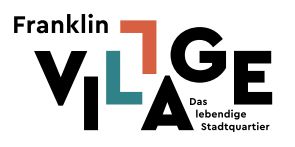
![]() D - 68309 Mannheim: Since 2012, five largely mixed-use neighbourhoods have been developed on an area of 94 hectares on what was once the largest barracks site of the US armed forces in Germany, the so-called "Benjamin Franklin Village". Residential buildings for around 9,300 people (4,100 residential units) and around 2,000 jobs are to be created. A 50-hectare park will also be realised. Existing buildings will be used, energy-efficiently renovated and modernised, but many new buildings will also be constructed. The first residents moved in on 31 December 2017, and in December 2019 the number of residents exceeded 1,000. Completion: 2025
D - 68309 Mannheim: Since 2012, five largely mixed-use neighbourhoods have been developed on an area of 94 hectares on what was once the largest barracks site of the US armed forces in Germany, the so-called "Benjamin Franklin Village". Residential buildings for around 9,300 people (4,100 residential units) and around 2,000 jobs are to be created. A 50-hectare park will also be realised. Existing buildings will be used, energy-efficiently renovated and modernised, but many new buildings will also be constructed. The first residents moved in on 31 December 2017, and in December 2019 the number of residents exceeded 1,000. Completion: 2025
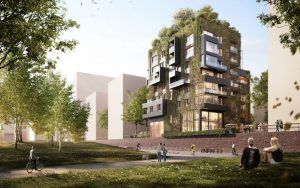 D - 20457 Hamburg Baakenhafen: das achtgeschossige Stadthaus in der Hamburger Hafencity wird mit 52 Wohnungen als ökologisch-sozialer Gesamtorganismus für ca. 180 Bewohner realisiert. Die konsequente ökologische Ausrichtung des Gebäudekonzepts sorgt für einen niedrigen ökologischen Fußabdruck über den gesamten Lebenszyklus: Massivholzbauweise (Brettstapel), Solarstromanlagen an Fassade und auf dem Dach, Wasser- und Biomassekreislaufsysteme mit Grauwasserrecycling und Terra-Preta-Produktion, intensive Fassadenbegrünung und das Gewächshaus zum Gemüseanbau auf dem Dach. Der Entwurf wurde im we-house Realisierungswettbewerb Baakenhafen mit dem ersten Preis ausgezeichnet. Fertigstellung: 2025/2026
D - 20457 Hamburg Baakenhafen: das achtgeschossige Stadthaus in der Hamburger Hafencity wird mit 52 Wohnungen als ökologisch-sozialer Gesamtorganismus für ca. 180 Bewohner realisiert. Die konsequente ökologische Ausrichtung des Gebäudekonzepts sorgt für einen niedrigen ökologischen Fußabdruck über den gesamten Lebenszyklus: Massivholzbauweise (Brettstapel), Solarstromanlagen an Fassade und auf dem Dach, Wasser- und Biomassekreislaufsysteme mit Grauwasserrecycling und Terra-Preta-Produktion, intensive Fassadenbegrünung und das Gewächshaus zum Gemüseanbau auf dem Dach. Der Entwurf wurde im we-house Realisierungswettbewerb Baakenhafen mit dem ersten Preis ausgezeichnet. Fertigstellung: 2025/2026
![]() D - 79111 Freiburg-Dietenbach: one of the largest new development areas in Germany is being built on 110 hectares for 6,900 apartments. The intention is to create living space for 15,000 residents. Six new neighborhoods are to be developed in Freiburg's west along the Dietenbach as a climate-neutral and colorful district with short distances, open spaces, schools, sports facilities, daycare centers and shopping opportunities. It should be possible to move into the first apartments around 2025/2026. Completion: ~2035
D - 79111 Freiburg-Dietenbach: one of the largest new development areas in Germany is being built on 110 hectares for 6,900 apartments. The intention is to create living space for 15,000 residents. Six new neighborhoods are to be developed in Freiburg's west along the Dietenbach as a climate-neutral and colorful district with short distances, open spaces, schools, sports facilities, daycare centers and shopping opportunities. It should be possible to move into the first apartments around 2025/2026. Completion: ~2035
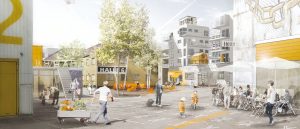
![]() D - 80335 Munich: On the site of the former Luitpold barracks and neighbouring areas, a total of around 900 flats and space for 770 workplaces are to be built in a new mixed-use urban quarter. According to a resolution passed by the city of Munich's planning committee on 20 May 2020, 370 residential units are to be built in timber construction in the "Kreativfeld", part of the creative quarter. The urban neighbourhood between Dachauer-, Loth-, Schwere-Reiter-, Heß- and Infanteriestraße will combine living and working with art, culture and knowledge. Twelve building neighbourhoods and a mixed-use area are to be created. Tenders for building cooperatives and developers are due to start soon on the "Kreativfeld" (as of 4 June 2020). Completion (1st BA Kreativfeld): ~2024
D - 80335 Munich: On the site of the former Luitpold barracks and neighbouring areas, a total of around 900 flats and space for 770 workplaces are to be built in a new mixed-use urban quarter. According to a resolution passed by the city of Munich's planning committee on 20 May 2020, 370 residential units are to be built in timber construction in the "Kreativfeld", part of the creative quarter. The urban neighbourhood between Dachauer-, Loth-, Schwere-Reiter-, Heß- and Infanteriestraße will combine living and working with art, culture and knowledge. Twelve building neighbourhoods and a mixed-use area are to be created. Tenders for building cooperatives and developers are due to start soon on the "Kreativfeld" (as of 4 June 2020). Completion (1st BA Kreativfeld): ~2024
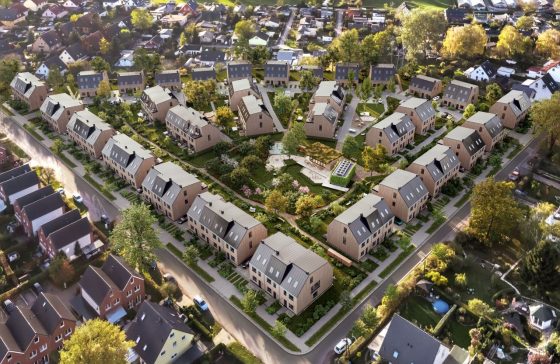
![]() D - 13127 Berlin-Pankow: On a 23,000 sqm plot in Pankow-Französisch Buchholz, a housing estate with 84 residential units with a total living space of approx. 12,000 sqm plus a community house will be built. Predominantly renewable and healthy building materials such as wood and cellulose with positive CO2-balance sheet. In the centre of the settlement there is an orchard with a community house. The heat and electricity generation in the settlement is fossil-free. Start of construction/completion (planned): 2022/2024
D - 13127 Berlin-Pankow: On a 23,000 sqm plot in Pankow-Französisch Buchholz, a housing estate with 84 residential units with a total living space of approx. 12,000 sqm plus a community house will be built. Predominantly renewable and healthy building materials such as wood and cellulose with positive CO2-balance sheet. In the centre of the settlement there is an orchard with a community house. The heat and electricity generation in the settlement is fossil-free. Start of construction/completion (planned): 2022/2024
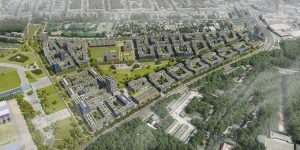
![]() D - 13405 Berlin-Tegel: A climate-neutral urban quarter in timber construction with more than 5,000 apartments is to be built. This will make it the largest timber construction quarter in the world. In addition to the apartments, several schools, daycare centers, sports facilities, shopping opportunities and lots of greenery are also planned for the development area with 46 ha geplant. Eine starke Durchgrünung sorgt für eine klimaangepasste und wassersensible Stadtentwicklung und wirkt auch über das Quartier hinaus. Start Hochbau: voraussichtlich 2026. Geplante Fertigstellung: Mitte der 2030er Jahre
D - 13405 Berlin-Tegel: A climate-neutral urban quarter in timber construction with more than 5,000 apartments is to be built. This will make it the largest timber construction quarter in the world. In addition to the apartments, several schools, daycare centers, sports facilities, shopping opportunities and lots of greenery are also planned for the development area with 46 ha geplant. Eine starke Durchgrünung sorgt für eine klimaangepasste und wassersensible Stadtentwicklung und wirkt auch über das Quartier hinaus. Start Hochbau: voraussichtlich 2026. Geplante Fertigstellung: Mitte der 2030er Jahre
![]() D - 34246 Vellmar-Nord: The urban design, with around 550 residential units on a 16-hectare site, envisages a mix of detached single houses and houses in a more compact design using semi-detached and terraced houses and multi-storey housing. In terms of size, it will be one of the largest plus-energy housing estates in Germany. The plus-energy concept takes into account heat, electricity and mobility. Start of construction: from April 2020. Completion: ~2024
D - 34246 Vellmar-Nord: The urban design, with around 550 residential units on a 16-hectare site, envisages a mix of detached single houses and houses in a more compact design using semi-detached and terraced houses and multi-storey housing. In terms of size, it will be one of the largest plus-energy housing estates in Germany. The plus-energy concept takes into account heat, electricity and mobility. Start of construction: from April 2020. Completion: ~2024
Newly built districts with space-efficient mobility offers
NL - 3526 KM Utrecht: On the west side of the Merwedekanal, a new sustainable urban district is being built in a central location not far from Utrecht's main railway station. The plan is to create a mixed-use district with 6,000 flats for approximately 12,000 residents. The area is to become a showcase for healthy and sustainable living with innovative concepts for recycling, energy production, climate adaptation and mobility solutions. Planned completion: by 2024D - Frankfurt a.M. Ginnheim: The 342 existing apartments in the 19 three-storey row buildings will be renovated to improve energy efficiency (insulation and new windows) and two storeys will be added. A total of around 680 new, mainly smaller apartments are being created. 300 apartments are being built in 15 new buildings in so-called gate and bridge houses. Architecture: Stefan Forster (Frankfurt). Construction began in 2017. Completion of the storeys: End of 2019. Completion of the new buildings (post-densification): 2023.
![]() D - 50181 Bedburg Kaster: Around 150 residential units on 5.6 hectares are planned in the first resource conservation housing estate of the town of Bedburg and RWE Power. The conservation of natural resources is at the forefront of this project, which is being developed under the name "Factor X", already established in specialist circles. Further key data: 55,500 square metres of living space, around 110 building plots and an extension of the forest kindergarten are planned.
D - 50181 Bedburg Kaster: Around 150 residential units on 5.6 hectares are planned in the first resource conservation housing estate of the town of Bedburg and RWE Power. The conservation of natural resources is at the forefront of this project, which is being developed under the name "Factor X", already established in specialist circles. Further key data: 55,500 square metres of living space, around 110 building plots and an extension of the forest kindergarten are planned.

![]() D - 28217 Bremen: With the development of the 15-hectare former Kelloggs factory site on the south side of the Europahafen, a new mixed urban quarter is to be created in Bremen in the immediate vicinity of the city centre and directly on the Weser. In addition to a variety of residential options, it will include office and commercial space, schools and daycare centers, recreational facilities and public spaces. Modern ecological mobility and energy concepts and sophisticated architecture determine the image of the quarter. Planned start of construction: 2021, planned completion: ~2031
D - 28217 Bremen: With the development of the 15-hectare former Kelloggs factory site on the south side of the Europahafen, a new mixed urban quarter is to be created in Bremen in the immediate vicinity of the city centre and directly on the Weser. In addition to a variety of residential options, it will include office and commercial space, schools and daycare centers, recreational facilities and public spaces. Modern ecological mobility and energy concepts and sophisticated architecture determine the image of the quarter. Planned start of construction: 2021, planned completion: ~2031
![]() D - 52249 Eschweiler: the municipality of Eschweiler has designated a second Factor X housing estate with 34 plots on 3.1 hectares in the development plan. Construction of the first houses can begin as early as April. Resource- and energy-efficient single-family houses will be built on around 30 plots and four multi-family houses will be built according to the Factor X concept. Further elements of sustainable urban development, such as extensively greened roofs and a central heat supply using wood pellets, are planned. RWE Power is the landowner and developer. The development was completed in spring 2019.
D - 52249 Eschweiler: the municipality of Eschweiler has designated a second Factor X housing estate with 34 plots on 3.1 hectares in the development plan. Construction of the first houses can begin as early as April. Resource- and energy-efficient single-family houses will be built on around 30 plots and four multi-family houses will be built according to the Factor X concept. Further elements of sustainable urban development, such as extensively greened roofs and a central heat supply using wood pellets, are planned. RWE Power is the landowner and developer. The development was completed in spring 2019.
![]() D - 52459 Inden-Altdorf: The municipality of Inden has designated a further Factor X housing estate with 50 plots in the development plan. Construction of the first houses can begin as early as April. Resource-efficient single-family homes, semi-detached houses or terraced houses based on the Factor X concept will be built. RWE Power is the land owner and developer. The development was completed in spring 2019.
D - 52459 Inden-Altdorf: The municipality of Inden has designated a further Factor X housing estate with 50 plots in the development plan. Construction of the first houses can begin as early as April. Resource-efficient single-family homes, semi-detached houses or terraced houses based on the Factor X concept will be built. RWE Power is the land owner and developer. The development was completed in spring 2019.
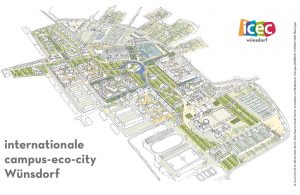 D - 15806 Wünsdorf:
D - 15806 Wünsdorf:![]() Konzept einer ökologischen Modell- und Zukunftsstadt für das 21. Jahrhundert. Seit 2017 entwickelt ein Team von Pionieren des ökologischen Städtebaus um Prof. Dr. Ekhart Hahn eine neu zu errichtende Campus-Eco-City am Standort Wünsdorf bei Zossen (ca. 40 km von Berlin). Die ehemalige "verbotene" Stadt Wünsdorf mit einer Fläche von insgesamt 600 ha bietet ideale Bedingungen für die Realisierung dieser Vision, die auf ca. 100 ha realisiert werden soll. Fertigstellung: ~2030
Konzept einer ökologischen Modell- und Zukunftsstadt für das 21. Jahrhundert. Seit 2017 entwickelt ein Team von Pionieren des ökologischen Städtebaus um Prof. Dr. Ekhart Hahn eine neu zu errichtende Campus-Eco-City am Standort Wünsdorf bei Zossen (ca. 40 km von Berlin). Die ehemalige "verbotene" Stadt Wünsdorf mit einer Fläche von insgesamt 600 ha bietet ideale Bedingungen für die Realisierung dieser Vision, die auf ca. 100 ha realisiert werden soll. Fertigstellung: ~2030
 D - 73262 Reichenbach an der Fils: In the district of Esslingen in Baden-Württemberg, a new neighbourhood is being built with a so-called "cold local heating network", which will not only heat the 41 houses in an environmentally friendly way in future, but will also contribute to the temperature control in summer. Photovoltaic systems, including storage, which will supply the neighbourhood with home-generated solar power around the clock, round off the energy concept. An innovative local heating supply based on geothermal energy takes centre stage.
D - 73262 Reichenbach an der Fils: In the district of Esslingen in Baden-Württemberg, a new neighbourhood is being built with a so-called "cold local heating network", which will not only heat the 41 houses in an environmentally friendly way in future, but will also contribute to the temperature control in summer. Photovoltaic systems, including storage, which will supply the neighbourhood with home-generated solar power around the clock, round off the energy concept. An innovative local heating supply based on geothermal energy takes centre stage.
D - Zwischen Essen und Bottrop entstehen auf insgesamt 170![]() 0 ha area 5 new development areas with a total area of 150 ha, along the Emscher, which no longer stinks of sewage:
https://freiheit-emscher.de/
0 ha area 5 new development areas with a total area of 150 ha, along the Emscher, which no longer stinks of sewage:
https://freiheit-emscher.de/
D - 40625 Düsseldorf: The initiative "Wohnen mit Kindern e.V." (Living with Children) is planning its fourth community housing project in the Düsseldorf city area with 23 residential units. The association has already successfully realized a cooperative-oriented project on Otto-Petersen Straße (1995) as well as two condominium projects in Gerresheim, qbus (2013) and wmk3 (2017). The association aims to create attractive and affordable housing for families with children in particular. All projects realized to date have been planned and occupied by residents in different life situations and are thus genuine multigenerational housing projects. In September 2020, the construction group purchased a plot in the Quellenbusch development area in Gerresheim. Planned completion: approx. 2022
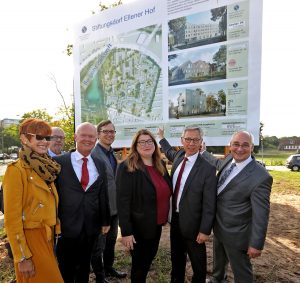
![]() D - 28329 Bremen-Osterholz: At least 500 apartments are planned, which will offer a new home to around 1,000 Bremen residents of all ages and from different social classes and cultures. In close cooperation with the Free Hanseatic City of Bremen, the Bremer Heimstiftung, as the owner of the site, is therefore not only working on new living space. Social institutions, clubs and cultural institutions will also enrich the "Ellener Hof Foundation Village" in the future. In addition, the partners are focusing on attractive green spaces. The respectful treatment of the valuable stock of trees, bushes and vegetation on the property is the basis and an integral part of all planning. Construction began on 7.9.2018. Planned completion: 2025(?)
D - 28329 Bremen-Osterholz: At least 500 apartments are planned, which will offer a new home to around 1,000 Bremen residents of all ages and from different social classes and cultures. In close cooperation with the Free Hanseatic City of Bremen, the Bremer Heimstiftung, as the owner of the site, is therefore not only working on new living space. Social institutions, clubs and cultural institutions will also enrich the "Ellener Hof Foundation Village" in the future. In addition, the partners are focusing on attractive green spaces. The respectful treatment of the valuable stock of trees, bushes and vegetation on the property is the basis and an integral part of all planning. Construction began on 7.9.2018. Planned completion: 2025(?)
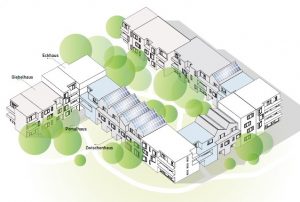
![]() D - 14055 Berlin-Charlottenburg: 665 units as a new housing estate with two-, three- and four-room flats. Also detached houses, shops, doctors' surgeries and a day care centre. Mix of rented and owner-occupied flats.
The contract was signed on 14 March 2018 after 5 years of negotiations. The company expects construction to start at the end of 2019 and the final construction phase could be completed in 2025.
Low-energy house standard, CHP, photovoltaic system, sustainable mobility concept with bicycle parking spaces outside the front doors and e-bikes, electric cars in the car-sharing fleet. Neighbourhood with Cradle to Cradle certification and healthy building materials, green roof.
D - 14055 Berlin-Charlottenburg: 665 units as a new housing estate with two-, three- and four-room flats. Also detached houses, shops, doctors' surgeries and a day care centre. Mix of rented and owner-occupied flats.
The contract was signed on 14 March 2018 after 5 years of negotiations. The company expects construction to start at the end of 2019 and the final construction phase could be completed in 2025.
Low-energy house standard, CHP, photovoltaic system, sustainable mobility concept with bicycle parking spaces outside the front doors and e-bikes, electric cars in the car-sharing fleet. Neighbourhood with Cradle to Cradle certification and healthy building materials, green roof.
![]() 25704 Meldorf: 5 ecological detached and semi-detached houses are being built in the immediate vicinity of Naturbau Meldorf's depot. In addition, there is the possibility for a construction/residential group to help design a cross-generational project on a plot for a further 5 to 8 apartments.
25704 Meldorf: 5 ecological detached and semi-detached houses are being built in the immediate vicinity of Naturbau Meldorf's depot. In addition, there is the possibility for a construction/residential group to help design a cross-generational project on a plot for a further 5 to 8 apartments.
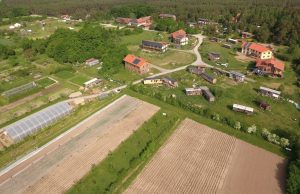
![]() D - 38489 Beetzendorf-Poppau: Here a new village for 300 inhabitants has been built since 1997. With currently 150 residents (approx. 60 units), a new self-sufficient village has been built since 1997, which enables people to live a sustainable lifestyle. There are 8 residential buildings plus the Regiohaus/Seminarzentrum, built in low-energy to passive house standards, in Sieben Linden (as of 10/2016). A straw-built guest house with 15 guest rooms is to be built in 2017/18.
D - 38489 Beetzendorf-Poppau: Here a new village for 300 inhabitants has been built since 1997. With currently 150 residents (approx. 60 units), a new self-sufficient village has been built since 1997, which enables people to live a sustainable lifestyle. There are 8 residential buildings plus the Regiohaus/Seminarzentrum, built in low-energy to passive house standards, in Sieben Linden (as of 10/2016). A straw-built guest house with 15 guest rooms is to be built in 2017/18.
Cologne-Ehrenfeld: approx. 4 ha area. Within the framework of a cooperative expert procedure, three planning offices developed an urban development plan in autumn 2013 as a basis for the further structural development of the area. The design by Ortner & Ortner from Cologne was selected as the winning design. The citizens wanted housing and culture instead of a shopping mall. The shopping mall was averted. Instead, the partly built-over and used, partly fallow area in the centre of Ehrenfeld is to be developed integratively. In addition to the Helios primary and comprehensive school (Groundbreaking was in Dec. 2019; both schools are expected to open for the school year 2023/2024 completed), a lively mix of housing, culture, commerce and retail is to be realized there. Completion: ~2024
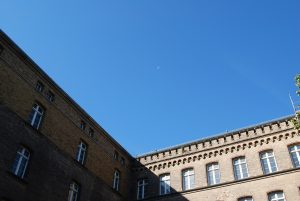
![]() D - 53115 Bonn: in Bonn's Südstadt, surrounded by residential buildings
D - 53115 Bonn: in Bonn's Südstadt, surrounded by residential buildings
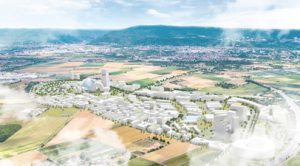
![]() D - 69124 Heidelberg: Under the motto Knowledge creates the city the IBA Heidelberg will take place from 2012 to 2022. One of the key projects of the IBA and its largest urban development project of international significance is the Patrick Henry Village (PHV) where once 8,000 Americans lived. An urban development vision is currently being developed for the conversion project, which covers an area of 92.7 ha, under the leadership of urban planner Kees Christiaanse (KCAP) from Zurich. The preliminary city-wide plans envisage apartments for around 10,000 residents (approx. 4,200 residential units), as well as buildings with space for approx. 5,000 workplaces. Completion: ~2030
D - 69124 Heidelberg: Under the motto Knowledge creates the city the IBA Heidelberg will take place from 2012 to 2022. One of the key projects of the IBA and its largest urban development project of international significance is the Patrick Henry Village (PHV) where once 8,000 Americans lived. An urban development vision is currently being developed for the conversion project, which covers an area of 92.7 ha, under the leadership of urban planner Kees Christiaanse (KCAP) from Zurich. The preliminary city-wide plans envisage apartments for around 10,000 residents (approx. 4,200 residential units), as well as buildings with space for approx. 5,000 workplaces. Completion: ~2030
![]() D - 70191 Stuttgart: the city of Stuttgart assumes 7,500 apartments (for 11,000 inhabitants) and 4,000 jobs (as of 2015) on 85 ha. Start: 2026 at the earliest; completion: ~2032
D - 70191 Stuttgart: the city of Stuttgart assumes 7,500 apartments (for 11,000 inhabitants) and 4,000 jobs (as of 2015) on 85 ha. Start: 2026 at the earliest; completion: ~2032
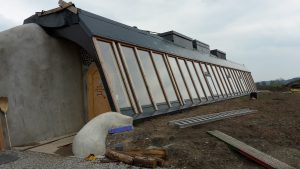
![]() D - 74594 Kreßberg: "Schloss Tempelhof" is a grassroots community that has existed in northern Baden-Württemberg since 2010. Almost 150 residents live on the 30-hectare village site. The ecovillage community is set to grow to 300 residents. The community practises solidarity agriculture based on permaculture principles. There are jobs in a market garden, animal husbandry, cheese dairy, beekeeping, bakery and in the kitchen. Others have been created in the seminar centre, the building sector, the administration and the Free Montessori School.
D - 74594 Kreßberg: "Schloss Tempelhof" is a grassroots community that has existed in northern Baden-Württemberg since 2010. Almost 150 residents live on the 30-hectare village site. The ecovillage community is set to grow to 300 residents. The community practises solidarity agriculture based on permaculture principles. There are jobs in a market garden, animal husbandry, cheese dairy, beekeeping, bakery and in the kitchen. Others have been created in the seminar centre, the building sector, the administration and the Free Montessori School.
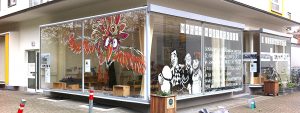
![]() D - 76131 Karlsruhe-Oststadt: Since 2013, the "Quartier Zukunft" real-world laboratory has been under construction in Karlsruhe, where the urban life of the future is being tested and developed. The city of the future has largely been built in Europe. This means that the major task of sustainable urban development lies in the transformation of the existing.
D - 76131 Karlsruhe-Oststadt: Since 2013, the "Quartier Zukunft" real-world laboratory has been under construction in Karlsruhe, where the urban life of the future is being tested and developed. The city of the future has largely been built in Europe. This means that the major task of sustainable urban development lies in the transformation of the existing.
![]() D - 81249 Munich-Freiham: on 350 ha with residential space for 20,000 and commercial space for 7,500 people. The goal is sustainable urban development that meets economic, ecological and social requirements in equal measure. The first residents should be able to move into their new apartments from the beginning of 2018. The new district is being built in several phases. The apartments are 50 percent privately financed, 30 percent socially subsidized and 20 percent allocated according to the "Munich Model".
D - 81249 Munich-Freiham: on 350 ha with residential space for 20,000 and commercial space for 7,500 people. The goal is sustainable urban development that meets economic, ecological and social requirements in equal measure. The first residents should be able to move into their new apartments from the beginning of 2018. The new district is being built in several phases. The apartments are 50 percent privately financed, 30 percent socially subsidized and 20 percent allocated according to the "Munich Model".
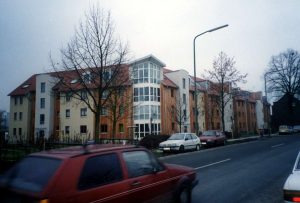
![]() D - 40549 Düsseldorf-Heerdt: 156 WE, 60 Permakultur-Mietergärten, Ökologisches Zentrum für Angebote der ökopädagogischen Bildungsarbeit für Grundschulklassen und Kindergärten.
Weitere 20 - 30 Einfamilienhäuser (verbunden mit einem Erdwärme-Heizungsprojekt), ein Geschosswohnungsbau und ein Kindergarten sind geplant.
D - 40549 Düsseldorf-Heerdt: 156 WE, 60 Permakultur-Mietergärten, Ökologisches Zentrum für Angebote der ökopädagogischen Bildungsarbeit für Grundschulklassen und Kindergärten.
Weitere 20 - 30 Einfamilienhäuser (verbunden mit einem Erdwärme-Heizungsprojekt), ein Geschosswohnungsbau und ein Kindergarten sind geplant.



